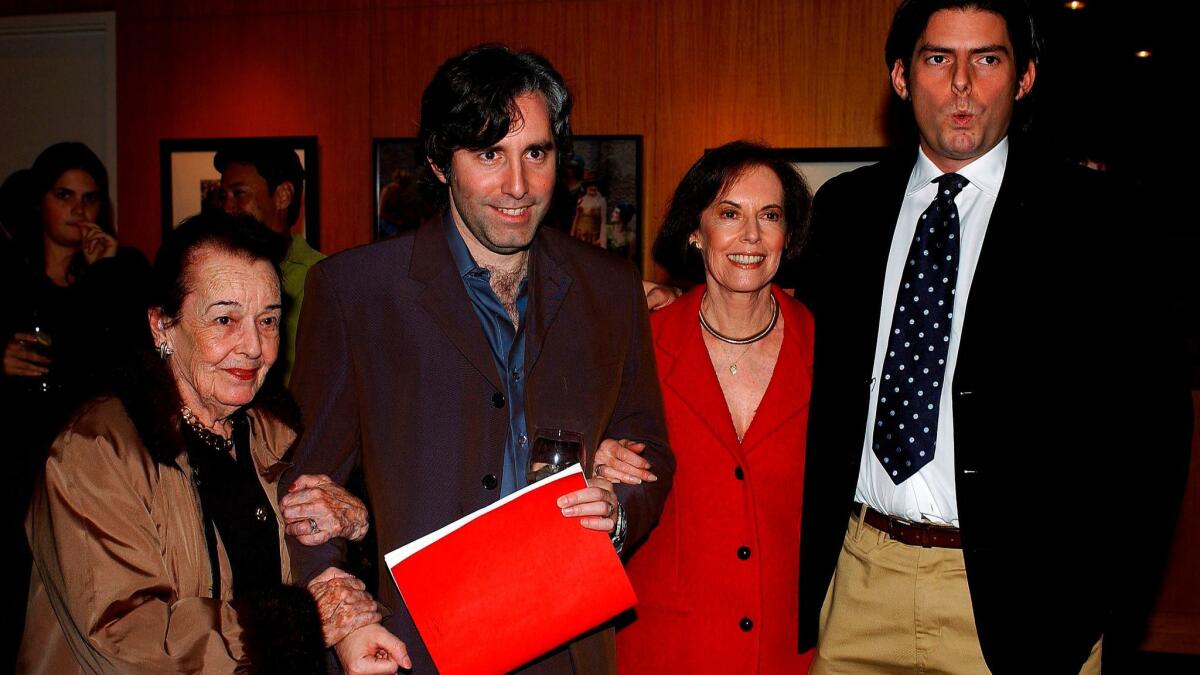Lupita Tovar, a Mexican star in Hollywood’s golden era, dies at 106
- Share via
When Bela Lugosi and his co-stars wrapped up another day of filming on “Dracula,” a lesser known group of actors quietly moved onto the set to begin a long night’s work.
Carlos Villarias became Count Dracula and Lupita Tovar — a young actress who’d recently moved from her home in Oaxaca, Mexico, to Hollywood — assumed the role of Mina, the film’s heroine who escapes a certain vampiric fate when a wooden stake is plunged into Dracula’s chest.
For the record:
6:08 p.m. June 20, 2025An earlier version of this article referred to director Ingmar Bergman as a burgeoning star.
Tovar, who died Friday in Los Angeles at the age of 106, went on to make more than 30 pictures — including “South of the Border,” “Maria,” “East of Borneo” and “The Cat Creeps.” One of her earlier movies, “Santa,” is believed to be one of the first with sound in the Mexican film industry.
Many of the movies, like “Dracula,” were filmed concurrently with their English-language counterparts, keeping production rolling around the clock and holding down costs with shared sets, cameras and lighting.
The young actress never bumped into Lugosi, who’d departed for the day by the time she arrived at the Universal studios at 7 p.m., ready for a full night of shooting.
“They had cobwebs everywhere that made it very eerie, you know, and so I got scared when I came onto the set,” she told NPR’s “Morning Edition” in a 2008 interview at her home in Los Angeles. She recalled that as filming dragged on into the predawn hours, an electrician on the scaffolding above would sometimes drop her a Hershey’s chocolate bar, presumably as an energy boost.
In the 1931 Mexican version of “Dracula,” Mina is transformed from the meek, easily swayed victim portrayed by Helen Chandler to a woman of far greater passion. Even the wardrobe was a startling contrast.
“My wardrobe was the sexiest ever,” Tovar recalled. “They gave me negligees that were transparent, you know. It was a different wardrobe than the American. Helen Chandler was very, you know, so ...”
To some, including Tovar, the Mexican version of “Dracula” was superior.
“I remember when I saw the English version later, I thought our costumes were sexier,” she told NPR in 2008. “We wanted our version to be the best and, according to the critics, I think it was.”
Tovar was born in Oaxaca, Mexico, in 1910 and grew up outside Mexico City, the ninth child in an impoverished family. She came to Hollywood as a teenager, acting in silent films until “Santa.” The story of a young woman who is deserted by her soldier boyfriend and driven — out of sheer desperation — to prostitution, “Santa” was probably not the first Mexican “talkie,” but it was certainly one of the first commercial breakthroughs of the sound era in Spanish-language cinema.
But the film’s popularity in her homeland did little to enhance Tovar’s fortune. In a 2006 interview with the Los Angeles Times, she recalled making $15 a night dubbing movies into Spanish. “I was ready to go home.”

In 1932, she married Paul Kohner, a Universal executive and later a powerful Hollywood agent who helped manage the careers of burgeoning stars such as Marlene Dietrich and Greta Garbo, and director Ingmar Bergman. Kohner is credited with conceiving and then propelling the process of filming English- and Spanish-language movies concurrently.
Tovar continued making movies until the 1940s, although her roles diminished and some of the films became more forgettable — “The Fighting Gringo” with George O’Brien and “An Old Spanish Custom” with Buster Keaton, then on the backside of his career.
She retired in the 1940s and soon became the matriarch of an entertainment family. Her daughter, Susan Kohner, was nominated for an Oscar as best supporting actress for her role in “Imitation of Life,” and two grandsons, Chris and Paul Weitz, are filmmakers and screenwriters who directed “American Pie” and “About a Boy.”
At the height of her career, Tovar was promoted as “The Sweetheart of Mexico” and featured on a Mexican postage stamp. More recently she was awarded the Ariel Award for lifetime achievement, Mexico’s equivalent of an Oscar.
When she was honored for her work by the Academy of Motion Picture Arts and Sciences in 2006, Tovar summed up her career quickly.
“Listen, I never dreamed it would happen.”
ALSO
Clarence Ditlow, auto safety watchdog and pioneer, dies at 72
Gwen Ifill, veteran journalist and co-anchor of ‘PBS NewsHour,’ dies at 61
Rocker Leon Russell, whose hits included ‘Tight Rope’ and ‘Lady Blue,’ dies at 74
Start your day right
Sign up for Essential California for the L.A. Times biggest news, features and recommendations in your inbox six days a week.
You may occasionally receive promotional content from the Los Angeles Times.




